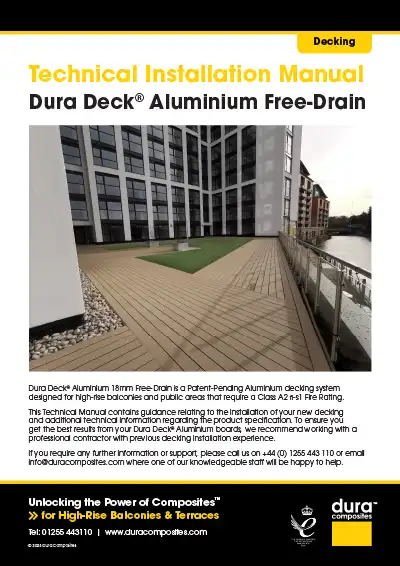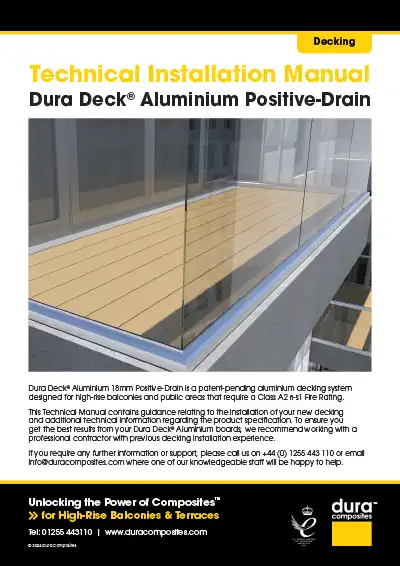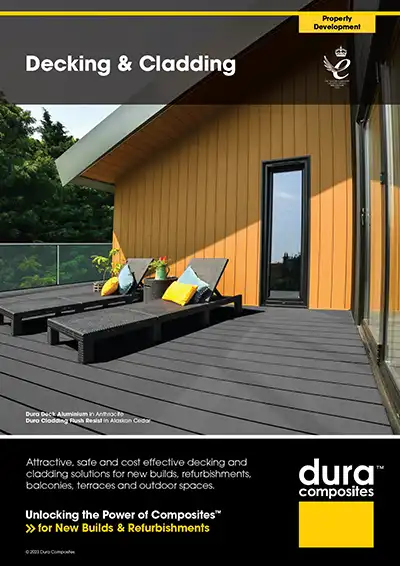
Installation Manuals
Dura Deck Aluminium Free-Drain
Dura Deck Aluminium Free-Drain is a patent-pending aluminium decking system designed for high-rise balconies and…
DownloadThe Decking & Cladding Team | +44 (0) 1255 440298
General Sales | +44 (0) 1255 446838
Sales Support | +44 (0) 1255 423601 (Option 5)
Transport | +44 (0) 1255 462567
In the wake of increasing scrutiny on fire safety in high-rise and multi-occupancy buildings, the demand for compliant, durable, and easy-to-install decking solutions has never been greater. Whether it’s the full replacement of existing decking, retrofitting to meet the latest building safety regulations, or remedial works following an EWS1 assessment, Dura’s non-combustible decking systems provide peace of mind for property owners, developers, and residents alike.
Despite the continuous development of the Building Act, first set out in 1984, the tragedy at Grenfell Tower in 2017 highlighted a need for further regulations and enforcement surrounding building safety across the country.
New legislation was formed under the Building Safety Act (2022) as a response to the disaster.With a focus on accountability, transparency and enforceability, the Act sets out to rectify structural and fire safety defects in higher-risk buildings, categorised as any building that is:
Every building that falls under the Building Safety Act must have a clearly identifiable Accountable Person (AP). The AP has a legal responsibility to repair and ensure the safety of any common areas of the building, such as the exterior of the building, stairways and corridors. Buildings covered by the Building Safety Act must have non-combustible cladding and balcony decking with a fire rating of A2-s1, d0 or higher (BS EN 13501-1:2007+A1:2009).
After Grenfell, many mortgage lenders lost confidence in properties situated in high rise blocks, leading to many mortgage applications being rejected and sales falling through.
In response to this, the External Wall System Fire Review Certificate (EWS1) was introduced. The EWS1 certificate is designed for residential properties that are over 11 metres high, have at least six storeys or have some form of combustible material on balconies.
EWS1 is not a legal requirement but is instead used as a mortgage valuation tool, giving lenders a clear indication of how safe a building is in terms of fire risk. Some lenders will refuse applications for buildings over 11 metres that do not have a certificate.
To gain an EWS1 certificate, a qualified professional will conduct a fire-risk appraisal of the cladding. A rating is given depending on the level of risk.
Ratings of A1, A2 or A3 are awarded to buildings where materials on or in the exterior walls are unlikely to support combustion. Ratings of B1 or B2 are awarded to buildings where combustible materials are found on or in the exterior walls. This doesn’t mean that the building isn’t safe, however, for B2 ratings, remediation work is recommended to meet fire safety standards.
In England and Wales, one EWS1 certificate covers the entire building and is valid for up to five years. If significant changes are made to the structure of the building within this time, it will need to be reassessed.
For buildings requiring safety defect remediation, government support schemes can help offset costs. The Building Safety Fund (BSF) provides financial assistance for remediation in buildings over 11 metres tall, covering expenses such as decking replacement.
To meet the highest safety standards, Dura Deck Aluminium and Dura Deck Inspire (porcelain) are excellent choices for decking remediation projects. These products comply with current high-rise building legislation, offering superior fire resistance, longevity, and low maintenance requirements.
At Dura, safety is our priority. Our decking products undergo rigorous testing in UKAS-accredited labs. Learn why this is essential here.
Find out how our market-leading composite products and applications are reshaping the industry.
Explore our solutions and services to help you build resilient, greener and safer infrastructure.

Installation Manuals
Dura Deck Aluminium Free-Drain is a patent-pending aluminium decking system designed for high-rise balconies and…
Download
Installation Manuals
Dura Deck Inspire 1.8 metre long porcelain planks achieve the look of traditional timber without…
Download
Installation Manuals
Dura Deck Aluminium Positive-Drain is a patent-pending aluminium decking system designed for high-rise balconies and…
Download
Attractive, safe and cost effective decking and cladding solutions for new builds, refurbishments, balconies, terraces…
DownloadTalk to our experienced team about how you can tap into our specialist knowledge and engineering capability for your project.